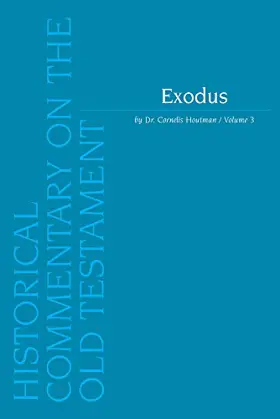

Exodus, Volume 3: Chapters 20–40
in Historical Commentary on the Old Testament
Pages
748
Publisher
Peeters
Published
6/1/2000
ISBN-13
9789042908055
This HCOT volume completes Houtman's monumental commentary on the Book of Exodus. It covers the legal texts (the decalogue and the 'Book of the Covenant') and most of the Sinai narrative. Beside a detailed and deliberate interpretation it provides an invaluable guide to the literature and the issues. The treatment of the 'tabernacle chapters' is of particular interest. The corresponding sections about the instructions for and the making of each part of the tabernacle are discussed together and placed in side by side columns in the translation. certainly make history' - M. Vervenne in Ephemerides Theologicae Lovanienses 68 (1992) 409. Orientalis 52 (1995) 743. be invaluable to students of Exodus' - G.I. Davies in Vetus Testamentum 48 (1998) 572.
Reviews
With the appearance of its final volume in English, Cornelis Houtman's monumental, three-volume commentary on Exodus reaches a wider audience than could its Dutch original. The bibliography has been updated to produce a fairly full state of the field for the fin du millénaire. This Exodus passes well the prime test of any commentary: utility. The reader will find a full and clear discussion of almost any question (s)he might raise. Not only matters of original meaning, but also the history of interpretation are addressed. While there may be a slight Protestant tilt, other Christian, Jewish and even Muslim readings are fully integrated—including the still-valuable work of some "conservative" commentators generally beneath the notice of critical biblicists. Even the evidence of art history illuminates the history of exegesis. On the other hand, while one hesitates to desire an even longer work, indices and a comprehensive bibliography would have been helpful in tracking down citations. Houtman wisely limits his bibliography to the most influential and/or recent treatments. Largely absent, however, is Hebrew-language Israeli scholarship (writers whose work is available in English, such as Haran, are fully cited). This is, of course, a broader problem in our expanding scholarly oikoumeme. Who will master the secondary literature in Dutch, Polish, Japanese, Hebrew, etc., etc.
[Full Review]
